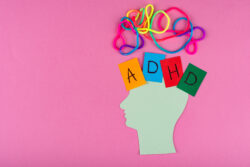How Mental Health Challenges Can Affect Eating Disorder Issues

Eating disorders are all too common. In the United States, about nine percent of people will be affected at some point in their lifetime according to the National Association of Anorexia Nervosa and Associated Disorders.
Although these numbers are high, eating disorders are not often talked about. Whether it’s due to social stigma or shame about mental illness, you may have questions without immediate answers.
One of the first questions people often wonder about when faced with an eating disorder themselves, or upon hearing about them, is “how do eating disorders affect mental health?” This is a complex question, but it’s best understood with a foundation as to what eating disorders are.
What is an eating disorder?
An eating disorder is a psychological disorder that presents through an abnormal focus on food, exercise, weight and body image. A person’s preoccupation with these things disrupts daily life and is harmful to the body.
The Diagnostic and Statistical Manual of Mental Disorder, or DSM-5, identifies and defines the most common eating disorders and their signs and symptoms. The most common eating disorders are Anorexia Nervosa, Bulimia Nervosa and Binge Eating Disorder. Consult the below details for even more information on these issues.
Anorexia: characterized by unwarranted dieting in response to a distorted body image and an extreme worry and distress over gaining weight or appearing fat.
Bulimia: characterized by periods of heavy eating followed by unreasonable actions such as self-induced vomit or extreme exercise to avoid gaining weight.
Binge eating: characterized by periods of heavy eating in a short period of time that cause intense feelings of shame or embarrassment. Binge eating happens at least once a week over a period of three months.
Eating disorders come with a host of signs and symptoms, but they all share an abnormal and disordered focus on food and body image. Other signs might include hiding food or not eating in front of other people, extreme mood swings, compulsively working out, obsession with counting calories, rituals associated with eating, quick weight changes and difficulty regulating body temperature. It is also important to note that women are affected more frequently than men by eating disorders according to the Office on Women’s Health.
Many people who struggle with mental health eating disorders feel that they lack control over some aspect of their lives. Closely managing food intake may alleviate some stress because a person feels that they have regained a sense of control.
How do eating disorders affect mental health?
Eating disorders and mental health issues are closely related. Not only are eating disorders diagnosable mental illnesses, but they also impact other aspects of mental health. Here are some of the most prevalent ways that the two are connected.
1. Dangerous symptoms
There are tremendous effects of eating disorders on mental health, and some of them can be dangerous or life-threatening. Eating disorders are more lethal than other mental illnesses, second only to opioid overdose, according to the National Association of Anorexia Nervosa and Associated Disorders. Often, individuals restrict calories so significantly that they die from malnutrition, and as many as 26% of those with eating disorders attempt suicide. Immediate treatment is extremely important to address any eating disorder.
2. Impaired daily functioning
In order to sustain an eating disorder, a person may hide while eating, attempt to cover up episodes of binging or vomiting, dress in layers to conceal weight changes, steal or hoard food, use laxatives to control weight, avoid settings or events with food or join multiple gyms to avoid comments about time spent there. These erratic behaviors can greatly disrupt normal living.
In addition to unusual behaviors, eating disorders can also cause a variety of harmful side effects. The National Eating Disorders Association identifies several possible effects that may impair daily functioning, such as dizziness, feeling cold, stomach cramps and difficulty concentrating. Eating disorders can also affect sleep and mood and even cause seizures.
3. Long-term health consequences
Other side effects are more clearly a result of long-term disordered eating patterns, like tooth erosion (from vomiting), dry skin and hair, brittle nails, a layer of fine body hair (called lanugo), muscle weakness and yellow skin. The Clinical Journal of Gastroenterology found that patients with eating disorders were more likely to suffer from a host of digestive problems like stomach rupture, irritable bowel syndrome and gastro esophageal reflux disease. Eating disorders can also cause arrhythmia (irregular heart beats), congestive heart failure and sudden cardiac arrest according to Cardiology in Review.
Eating disorders have significant health consequences, and it’s well documented that changes to physical health affect mental health. With eating disorders specifically, there is a clear link between the body and the mind and treatment is most effective when it addresses both.
4. Greater risk of co-occurring disorders
A person struggling with an eating disorder is at increased risk of co-occurring disorders like anxiety, depression, obsessive compulsive disorder or substance use disorder. According to a study published in Psychosomatic Medicine, 97 percent of patients being treated for an eating disorder were also diagnosed with one or multiple mental health disorders. About 94 percent of patients struggled with depression or a related mood disorder and 56 percent of patients struggled with an anxiety disorder.
This high correlation between mental health and eating disorders can leave someone wondering which came first. There is no one-size-fits-all answer to this question. It’s evident that they contribute to each other, however, and it may be relevant to note that eating disorders typically have a genetic component, too.
Facing co-occurring mental health and eating disorder challenges
If you or someone you know is struggling with an eating disorder, the time to reach out is now. Eating disorders can greatly disrupt daily life, have terrible short and long-term health consequences, increase the likelihood of other mental illness and could even lead to death.
Invest in yourself and in the people you care about. Reach out for help by contacting High Focus Centers PA, an outpatient clinic for teens and adults for the treatment of eating disorders and mental health. Visit us online today, or call (610) 644-6464 to get confidential and compassionate help from certified professionals.
In This Blog...
Related Posts

What Is the Difference Between a Panic Attack and an Anxiety Attack

Understanding Oppositional Defiant Disorder in Adolescents and Treatment Approaches at High Focus Centers Pennsylvania

ADHD Tools and Tips: Expert Insights from High Focus Centers PA

How Bullying Can Cause Co-Occurring Disorders in Adolescents




